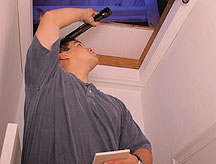When good appliances go bad
Fix it or junk it? If you can salvage a busted machine with a simple repair job, you'll save plenty.
(Money Magazine) -- The hot water goes cold, the air conditioner goes hot or maybe the washing machine's spin cycle is starting to sound like a Harley-Davidson rally. Alas, your warranty on the appliance in question expired long ago.
Suddenly you're faced with a tough, potentially pricey decision: fix the broken item or replace it? Repair would cost less in the short term, but you'd hate to invest in something that could spring another problem soon. These guidelines will help you decide.
If an electronic device cost less than $200, junk it without further thought. Repairing a relatively inexpensive item like a cordless phone or countertop microwave is not cost-effective.
If numerous consumers have had the same problem with a relatively new product, the company may offer free repairs or other compensation even if your original warranty has expired. Before you call, look up the year, model and serial number of your machine, which are usually located together on a sticker or a metal plate somewhere on the equipment. To qualify, you may also need to show the manufacturer your original receipt.
The repair-or-replace question is directly tied to how much longer you can expect the product to last. You can get data on the life expectancy of all sorts of home components, from faucets to refrigerators, at the National Association of Home Builders website (nahb.org). Your results may vary, depending on the quality of your model and how religious you've been about routine maintenance.
That said, just because your busted fridge is near or past its life expectancy doesn't necessarily mean it's beyond repair. "These aren't hard-and-fast expiration dates, they're variable," says Scott Brown, an appliance repair technician and former mechanical engineer in New London, N.H. In addition to its age, you need a reliable opinion about whether the item is in good shape and how serious the problem is -- that is, how much you'd pay to fix it. To get one...
Appliance and electronics repair people typically charge $50 to $100 to diagnose problems (then credit that amount against the repair bill if you go for the fix). Plumbers, electricians and other tradesmen will generally give you repair quotes for free. But your decision is only as good as their diagnosis of the problem, so get recommendations from savvy friends who have used the repairer before. Or consult Angieslist.com, a consumer rating site that charges $5 to $10 a month for access to thousands of reviews of local service providers.
Always demand a fixed price for any repair so you don't get stuck spending more than the old equipment warrants. If you think you can tackle the problem yourself, check out RepairClinic.com, where you can get free DIY instructions and even order parts.
Repair folks, of course, tend to be biased toward fixing existing equipment, since that's the service they offer. Then again, life expectancy data are, in many cases, provided by manufacturers, who certainly favor selling new equipment.
Want a third opinion? Try posting your dilemma at Applianceguru.com, an appliance repair forum run by repair tech Brown. As a general guideline, consider replacement if the item is beyond three-quarters of its life expectancy and repairs would cost more than a third of replacement value. In other words, it's probably not worth spending $700 to repair a 10-year-old fridge you could replace for $2,000.
In a few cases, there may be new bells and whistles that render your old appliance obsolete -- or simply unwanted. For example, it's never worth making major repairs to a top-loading clothes washer, says Brown: "They're such energy and water hogs, the new machine will pay for itself in a few years."
Conversely, clothes dryers haven't improved much in basic function over the years, although you just might want a new one to match your fancy new washer. In that case, a breakdown may offer the perfect excuse for some enjoyable shopping.
All news is bad news in real estate right now. Have you recently bought a house anyway? Send your story and photos to realstories@cnnmoney.com and you could be featured in an upcoming article. ![]()



